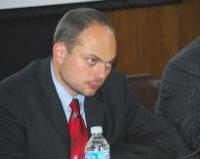
Vladimir Kara Murza
It is not at all important who and how will vote… It is extremely crucial who and how will count the votes.
— Joseph Stalin
Elections in Russia have long ceased to interest even the seasoned talking heads. The last competitive national vote was held in December 1999; since then a succession of legislative and political changes rendered voting practically meaningless. The electoral process is still diligently organized: thousands of polling places opened across the country; millions of ballots printed; no budget resources spared to ensure smooth procedures. Yet with most opposition organizations removed from the party register (and thus barred from elections), with direct parliamentary district elections and gubernatorial elections abolished, and with political censorship operating in major media outlets, “multiparty” elections in Vladimir Putin’s Russia are no better than farcical “votes” held in the Soviet Union or Nazi Germany.
Last Sunday’s voting for local and regional authorities that took place in 77 of Russia’s 83 provinces, with some 30 million voters on the rolls, was a case in point. With just 26 percent of Russians trusting Mr. Putin’s government to improve the situation in the country, and with just 27 percent prepared to back him in a presidential election, one would expect bad news for the ruling United Russia party. Yet, according to official results, the party received 58 percent of the overall vote, with truly Soviet-style showings in many localities (such as 78 percent in the Tyva Republic). According to local reports from across the country, United Russia’s “victory” was aided by the usual tricks, from the rigging of protocols and the eviction of observers to straightforward vote-buying. The price of a vote fluctuated from 100 rubles ($3) in Novosibirsk to 2,000 rubles ($66) in Chelyabinsk.
Since anti-Kremlin politicians were largely absent from the ballot, Sunday’s voting provided few insights into the state of Russia’s opposition. The only indicators are opinion polls, such as the recent Levada Center finding that 18 percent of Russians are ready to back the new pro-democracy coalition created by Boris Nemtsov and Mikhail Kasyanov. A few local success stories from last weekend’s elections prove the point. In Russia’s northwestern Sebezh District, the liberal Yabloko party came second with 21 percent of the vote, overtaking both communists and nationalists. As the party’s leaders acknowledged, the surprise was not the result itself (no one doubts that there are many Russians who want a democratic future for their country), but the fact that it was allowed to stand. Perhaps this was due to effective observer missions organized by local activists at nearly all polling places — something difficult to replicate on a national scale. Or perhaps the liberals were simply helped by geographic location: Sebezh District, which shares a border with Latvia, lies literally on the doorstep of the European Union.
Next year Russian voters will be called to the polls to “elect” a new parliament. After passionate debates, a majority of opposition leaders decided against a boycott. In December supporters of Mr. Nemtsov, Mr. Kasyanov, and other pro-democracy figures will gather in Moscow to establish the new Popular Freedom party (named after the main liberal opposition party in Czarist Russia in 1905–17) which will attempt to present its slate of candidates in the 2011 parliamentary “election.” “Many of our supporters are asking: should we be participating in such a farce?” Mr. Nemtsov wrote last week. “My position is this: we should use every chance to present citizens with an alternative to Putin’s heinous police state.” It is by this measure — not as an election in any real sense, but as an opportunity to reach at least some voters with their anti-regime message — that Russia’s opposition leaders are approaching the upcoming vote in 2011.
























